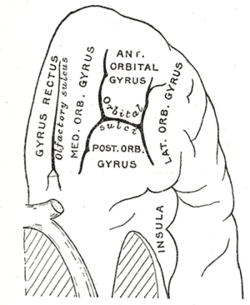Frontal lobe
The frontal lobe is an area in the brain of humans and other mammals, at the front of each cerebral hemisphere. It is in front of the parietal lobe and above and in front of the temporal lobes.
| Brain: Frontal lobe | ||
|---|---|---|
| Principal fissures and lobes of the cerebrum viewed laterally. (Frontal lobe is shown in pale green.) | ||
| Latin | Lobus Frontalis | |
| Part of | Cerebrum | |
| Artery | Anterior cerebral Middle cerebral | |
| Acronym(s) | FL | |
The frontal lobes includes Broca's area and takes action based on sensory information (sight, sound, touch) from the three rear areas of the cerebrum. The action is moderated by the influence of the pre-frontal cortex. The system is a delicate balance between the need to satisfy urges from the most ancient parts of the brain, such as hunger, self-defence and sex, with the need to act in a way which is socially acceptable.
The precentral gyrus, forming the back of the frontal lobe, contains the primary motor cortex. This controls voluntary movements of specific body parts.
Evolution
For many years, many scientists thought that the frontal lobe was comparatively larger in humans than in other primates. They thought that this was an important feature of human evolution and was the main reason why human cognition is different from that of the other primates.
However, this view has been challenged by later research. Magnetic resonance imaging was used to find the volume of the frontal cortex in humans, all living ape species and several monkey species. The human frontal cortex is not relatively larger than the cortex in the other great apes, but it is relatively larger than the frontal cortex in the lesser apes and the monkeys.[1]


